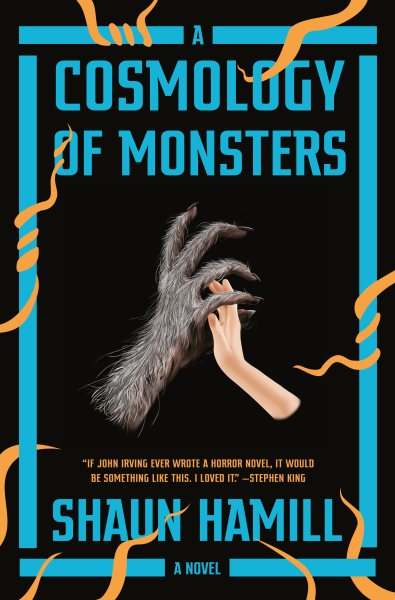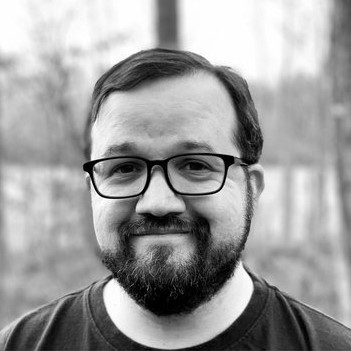Interview by Jana Hoops. Special to the Clarion-Ledger Sunday print edition (September 15)
 A self-acknowledged “steady diet of horror fiction and monster movies” as he was growing up has, for Arlinton, Texas, native Shaun Hamill, resulted in a debut novel that makes Halloween look like a day in the park.
A self-acknowledged “steady diet of horror fiction and monster movies” as he was growing up has, for Arlinton, Texas, native Shaun Hamill, resulted in a debut novel that makes Halloween look like a day in the park.
A Cosmology of Monsters turns the lives of one decent family into a nightmarish sequence of circumstances that blurs the lines between reality and the unknown–which is a good thing for those who love the spooky genre.
Hamill, who earned his writing stripes working on his MFA at the Iowa Writers’ Workshop, has seen previous fiction work appear in Carve magazine and Split Infinitive.
Today he resides in Alabama.
Tell me about how you developed such a strong interest in horror stories.

Shaun Hamill
I’ve always been drawn to stories about what might be hiding in the dark. Maybe it’s genetic: my mom kept stacks of horror and thriller novels around the house when I was a kid, and we rented a lot of thrillers from the video store. But I was also lucky enough to encounter three bits of kid-friendly horror at just the right time. The first were Alvin Schwartz and Stephen Gammell’s Scary Stories to Tell in the Dark books. The second was Nickelodeon’s Are You Afraid of the Dark? show. The third was AMC’s 10 p.m. classic monster movie feature every Friday night, where I first saw Bela Lugosi’s Dracula and Boris Karloff’s Frankenstein. From there it was a natural progression to slasher movies, Stephen King, Anne Rice, H.P. Lovecraft, and a lifelong love affair with the genre.
In your acknowledgements at the end of A Cosmology of Monsters, you refer to your debut novel as “this weird literary genre hybrid.” With the current rise in the interest of horror literature, film, and TV, explain where you believe this book fits (or does not fit) within the seemingly expanding genre of “horror.”
When I started Cosmology, I was only following Toni Morrison’s advice and writing the exact book I wanted to read–something that could balance emotional realism with the sense of dark wonder I seek in horror fiction. Through luck or kismet or what-have-you, my book is being released amid a true horror renaissance. In the past few years, artists like Carmen Maria Machado, Victor Lavalle, Ari Aster, and Jordan Peele have provided an embarrassment of elevated or literary horror, and we’ve also gotten a spate of great mainstream horror as well, including the new IT movies, Stranger Things, and the 2018 Halloween, for example. My hope is that Cosmology will sit somewhere between those two poles, attracting mainstream and literary readers alike.
A Cosmology of Monsters is a story about a really nice guy (Harry Turner) and his family, whose journey into darkness begins with the creation of a “haunted” Halloween house in their backyard. One thing leads to another, and eventually the entire family descends into a state of constant tragedies as each is touched by feelings of the presence of “monsters.” Please briefly explain the premise of this sprawling tale of fear and heartbreak.
A Cosmology of Monsters is a literary horror novel about a family running a haunted house attraction in the suburbs of Fort Worth, Texas. Narrated by the youngest child, Noah, the novel tracks the family’s fortunes across 50 years, and explores the monsters–both metaphorical and literal–that haunt them. It’s a generational saga, an homage to Stephen King and H.P. Lovecraft, and most importantly, a story about the ways love can either save or damn us.
Ultimately, the story is a mixture of thrill, suspense, mystery, and dark forces, all preying on a decent family that seems to attract more than its share of misfortune. Sometimes it feels as though the metaphorical and the “real” situations and settings blur, as scenes, and sometimes characters themselves, quickly transform. How should readers interpret these changes–and are there glimpses of hidden messages in these scenes?
Although much of the book is meant to be read literally, there are a few places where the literal and metaphorical blend–particularly in the “Turner Sequence” interludes between the main story sections. While I wrote the book to be enjoyed and understood in a single reading, I also designed in some secrets that will, I hope, reward multiple readings and close attention. The book has mysteries to be parsed, if the reader is willing.
Are you surprised by the acclaim and attention your debut book has drawn, and do you have plans for another book in this same vein in your future?
It’s funny. Right before my agent and I started submitting this book to editors, I told my wife that I didn’t expect it to sell. I thought it was too odd, that even if publishers enjoyed reading it, they wouldn’t know how to sell it to a general audience. I have never been happier to be wrong. The novel sold quickly, to the incredible and enthusiastic team at Pantheon Books. The entire publication journey has followed this pattern–with me as the gloomy naysayer, and the universe or fate surpassing all my expectations. This is a long way of saying that yes, I’m both surprised and incredibly grateful for the positive attention the book has drawn, and I hope it means I’ll get to write and publish more novels in this same vein in the future.
Bonus question for you! Define “Cosmology” and tell me about the title of the book.
“Cosmology” is an interesting term. In science and religion, it’s the study of the origin, life, and eventual death of the universe, and the rules or forces that govern those processes. In philosophy, it’s the study of existential questions that are beyond the reach of science. I’ve always loved the word–both its sound and its meaning. I think it’s an appropriate moniker for a story in which a narrator is examining his own life from end to end and uncovering the secret forces that have shaped his existence.
Shaun Hamill will be at Lemuria on Wednesday, September 18, at 5:00 p.m. to sign and discuss A Cosmology of Monsters.


Comments are closed.